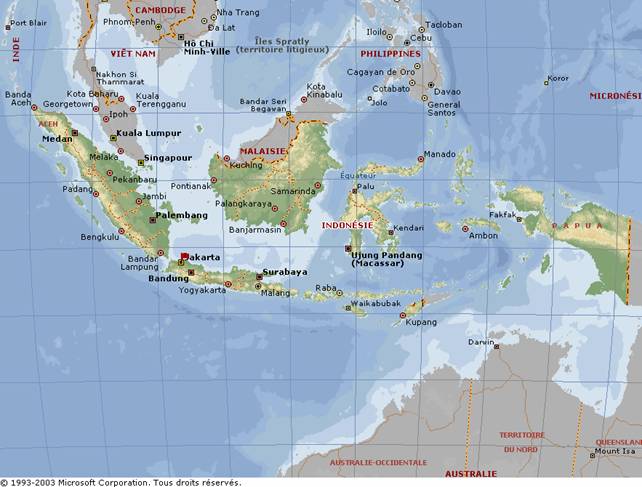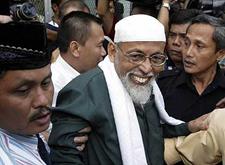

http://www.reuters.com/newsArticle.jhtml?type=topNews&storyID=4994942
Thu Apr 29, 2004 11:52 PM ET
By Telly Nathalia and Jerry Norton
Bashir, accused head of the al Qaeda-linked Jemaah
Islamiah network, was released on Friday after 18 months in prison for
immigration offences but was served with an arrest warrant and detained as he
left the jail in central
Police had said earlier they would re-arrest him over
allegations he had violated various anti-terrorism statutes. Under Indonesian
law he could be held for up to six months for questioning and investigation
before formal charges are laid.
The prison warden walked with Bashir, 65, to the jail
exit where police were waiting. An officer tried to give Bashir the arrest
warrant but he refused to accept it, witnesses said.
Asked for his reaction to being re-arrested, a smiling
Bashir said: "There is no problem. There is no problem. I'm fine."
Police then helped the cleric into a waiting armored vehicle and drove him to
police headquarters.
"What we witnessed just now was an illegal action
from the police. We have not seen that warrant. The warden has not seen that
warrant," said Munarman, a lawyer for Bashir.
"This proves the police are showing off in front
of their financial backers," he said, charging that the police were acting
after receiving millions of dollars in financial aid for anti-terrorism training
from the
"This morning, they showed their sponsors that
they have done the job," Munarman said.
Police had questioned the frail cleric earlier this
week regarding the October 2002 bomb blasts in
"He has been detained. He was released by the
penitentiary and we handed him the arrest warrant and then detained him,"
Major General Suyitno Landung, head of the police criminal investigation
department, told Reuters.
According to a police warrant shown this week to
reporters when Bashir was being questioned, allegations against him include
terror conspiracy, plotting attacks and the role of Jemaah Islamiah in terror
cases.
His re-arrest will likely further enrage his militant
supporters and anger Muslim leaders and politicians who accuse authorities of
bowing to
Hundreds of his supporters clashed with police before
dawn near the prison in
RUNNING BATTLES
The protesters tore up paving stones to hurl at police
and also tossed Molotov cocktails.
Police, clad in riot gear and carrying shields, threw
the stones back and responded with tear gas, clubs and water cannons in running
battles in the early morning hours that left many injured on both sides,
witnesses said.
Thirty-four police were hurt, a police spokesman said.
A number of vehicles, including some of the buses that
brought Bashir supporters into the capital during the night from
The clashes began when police tried to move the
protesters, who want Bashir to go free, from in front of the prison, witnesses
said. Some protesters were arrested.
Bashir finished on Friday the jail term for immigration
offences. He has consistently denied terrorism charges as well as links with
Jemaah Islamiah, believed by intelligence officials to be responsible for
violence throughout
Previous charges against Bashir of treason and of
leading Jemaah Islamiah were either dismissed or overturned.
Arresting Bashir and the prospect of a fresh trial
poses a challenge to the world's most populous Muslim nation ahead of
presidential elections in July, especially with sentiment for
In the past two weeks, Bashir has entertained a stream
of visitors at the prison, from Islamist politicians to mainstream Muslim
leaders, all accusing the
"Clearly this is intervention from foreigners,
namely the
(With additional reporting by Achmad Sukarsono)
April 30, 2004 - 3:28PM

Bashir leaves prison in Jakata today. Photo: Reuters
Militant Muslim cleric Abu
Bakar Bashir will be charged with the deadly Bali nightclub bombings and a
string of other terrorist attacks across
Following Bashir's rearrest
amid riots today, Ansyaad Mbai, who heads Indonesia's anti-terrorism desk at the
security ministry, said the suspected Jemaah Islamiah spiritual leader would be
charged ``in relation to the Bali bombings and other terror bombings like (the
bombing of the) BCA Bank and Istiqlal Mosque (in Jakarta).
``The
Bashir was taken to police
headquarters today from Salemba Jail after around 1,000 elite paramilitary
police fired tear gas and water cannon to disburse several hundred of Bashir's
supporters, who pelted police lines with paving bricks.
Detectives can hold him for up
to six months using anti-terrorism laws put in place after
Mbai said when charges were
eventually laid, they would include the
The indictment would also list
the suicide bombing of the JW Marriott hotel in
Other attacks will include the
so-called Christmas Eve bombings of 2000 which killed 19 people, the bombing of
a
Investigators said yesterday
they now have enough evidence from jailed JI members in
Part of that evidence includes
accusations that convicted Bali bombers Mubarok and Imam Samudra has visited
Bashir at his notorious Ngruki school in Solo, central Java, to explain about
their ``job'' planned in Bali and seeking his permission for the October
operation.
Other evidence alleged Bashir
had inducted JI militants at a secret passing out parade held in a jungle
training camp at Hudaibiyah in the
Bashir's rearrest came after a
morning of running street battles.
Hundreds of riot police and
armoured vehicles with water cannons fought with almost 1,000 of Bashir's
supporters early this morning outside the jail, where he had been serving an
18-month sentence for minor immigration offences.
But when police moved to
rearrest the cleric early this morning, his outraged supporters went wild,
hurling paving bricks and glass at officers guarding the entrance to Salemba
jail.
They were eventually pushed
back and a short time ago a tired-looking Bashir was bundled into the back of an
armoured car and driven to police headquarters through riot police lines.
Most of Bashir's faithful had
been dispersed by the time the cleric was rearrested and a fleet of ambulances
were treating wounded police officers.
Detectives yesterday said they
planned to rearrest Bashir in relation to terrorism offences, including
allegations he presided over a Jemaah Islamiah militant passing out parade in
the southern
Last September a court jailed
Bashir for four years for taking part in a JI plot to overthrow the government
but said there was no proof he was the leader.
An appeal court in November
overturned the treason conviction but ruled that Bashir must serve three years
for the lesser crimes.
Last month the Supreme Court
halved that sentence and said time spent in detention counted towards it.
Police say they have new
evidence against Bashir implicating him in terrorist acts.
AAP/AFP
http://www.rfi.fr/actufr/articles/052/article_27761.asp
Indonésie
Bashir
arrêté dès sa sortie de prison
La
police indonésienne a arrêté Abou Bakar Bashir à sa sortie de prison
provoquant quelques échauffourées avec ses partisans venus le soutenir. Les
policiers affirment disposer de nouveaux indices accablants pour l'émir
présumé de
De
notre correspondant à Djakarta
Une
centaine de militants islamistes s'étaient réunis vendredi matin devant la
prison centrale de Jakarta. Certains étaient en tenue paramilitaire quand
d'autres arboraient les habits traditionnelles musulman, calot et djellabah
blanche, sous lesquels étaient dissimulés des bâtons et des pierres. Car les
fidèles d'Abou Bakar Bashir, dont l'arrestation, dès sa sortie de prison,
avait été annoncé la veille par la police, étaient venus pour en découdre
avec les forces de l'ordre.
Cinq
cents policiers et trois véhicules anti-émeutes avaient été mobilisés pour
empêcher les manifestants d'approcher la voiture blindé devant transporter le
chef présumé de
Cette
nouvelle arrestation est le dernier rebondissement d'un feuilleton judiciaire
qui alimente depuis plusieurs années la chronique juridico-politique
indonésienne. Abou Bakar Bashir est un prédicateur musulman d'origine
yéménite, militant pour l'instauration de
Lavé de tout soupçon
Le
vieux prédicateur dirige pourtant une école coranique qui apparaît depuis le
début des années 70 au centre d'un réseau informel de partisans islamistes.
Certains se retrouvent en Malaisie à la fin des années 80 après avoir fui,
comme lui, la répression de la dictature Suharto. Bashir revient d'exil après
la chute du dictateur en 1998. Certains de ses étudiants rentrent avec lui
alors que d'autres prennent le chemin de l'Afghanistan pour s'entraîner dans
les camps d'al-Qaïda. Après les attentats du 11 septembre,
Son
procès débute au printemps 2003 mais se conclu, quelques mois plus tard, par
un coup de théâtre. Contre toute attente, Bashir est lavé de tout soupçon de
terrorisme et n'est finalement condamné qu'à quatre de prison pour une
infraction à la législation sur l'immigration. «Que tous les suspects de
l'attentat de Bali soient des anciens étudiants de Bashir est une chose; mais
cela ne suffit pas à le rendre responsable de leur engagement dans le
terrorisme» explique alors le tribunal. Cette condamnation, ramenée à 18
mois de prison en appel au début de l'année 2004, provoque la colère des
voisins asiatiques de Jakarta mais également des États-Unis qui seraient à
l'origine de la réouverture de son dossier judiciaire. Les services secrets
américains qui détiennent plusieurs membres de
Jocelyn
GRANGE
Article
publié le 30/04/2004
http://www.french.xinhuanet.com/htm/04301914277.htm
3.5.2004.
Lundi
Monde
Indonésie
: 71 policiers blessés lors de l'arrestation de Bachir
JAKARTA,
30 avril (XINHUA) -- Les affrontements entre la police anti-émeutes et les
partisans du chef islamiste indonésien Abou Bakar Bachir tôt vendredi matin
ont fait au moins 71 blessés dans le camp de la police. Ils ont été
transportés sans tarder à deux hôpitaux de Jakarta, capitale indonésienne.
La
violence a éclaté entre les partisans de Bachir et la police qui tentait
d'arrêter le chef islamiste, soupçonné d'être le chef d'un réseau
terroriste et accusé d'avoir des liens avec les actes terroristes en Indonésie
après 2000, y compris l'explosion à la bombe survenue en octobre 2002 à Bali
et celle en août dernier à l'hôtel Marriott.
Juste
après l'aube, la police a utilisé des canons à eau pour forcer plusieurs
centaines de partisans de Bachir à quitter la porte de la prison Salemba, où
celui-ci venait de purger une peine de 18 mois pour violation de
Les
partisans ont jeté des pierres dans la direction des policiers anti-émeutes.
Entretemps,
au moins 27 partisans de Bachir et deux journalistes ont également été
blessés, dont deux grièvement.
Bachir,
âgé de 64 ans, a finalement été emmené à 7h00 (heure locale) au quartier
général de la police dans un véhicule blindé de la police.
Le
porte-parole de la police, Basyir Agmad Barmawe, a présenté ses excuses pour
cet incident, soulignant toutefois qu'il était " inévitable".
Bachir
est un admirateur déclaré d'Oussama ben Laden, mais qu'il a toujours nié
toute implication dans le terrorisme. Fin
Copyright
2000: pour l'Agence de Presse Xinhua